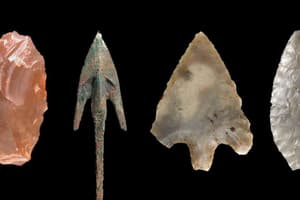Podcast
Questions and Answers
Which diagram is referred to as a 'bow-tie' diagram in accident analysis?
Which diagram is referred to as a 'bow-tie' diagram in accident analysis?
- Fault Tree (correct)
- Event Tree
- Top Event
- None of the above
What does the Fault Tree depict in the bow-tie diagram?
What does the Fault Tree depict in the bow-tie diagram?
- Prevention barriers (correct)
- Interrelationships among accidents
- Loss of control of the hazard
- None of the above
What does the Event Tree represent in the bow-tie diagram?
What does the Event Tree represent in the bow-tie diagram?
- Loss of control of the hazard
- Prevention barriers
- Barriers that prevent and mitigate consequences (correct)
- Interrelationships among accidents
What does the top event in the bow-tie diagram represent?
What does the top event in the bow-tie diagram represent?
What is the purpose of the bow-tie analysis?
What is the purpose of the bow-tie analysis?
Flashcards are hidden until you start studying
Study Notes
Bow-Tie Diagram Overview
- The 'bow-tie' diagram is a visual tool used in accident analysis, illustrating the relationship between causes and consequences of a risk or incident.
- It is named for its shape, resembling a bow-tie with a central event surrounded by cause (left side) and consequence (right side).
Fault Tree Representation
- The Fault Tree within the bow-tie diagram identifies potential faults or failures that could lead to the central event.
- It outlines systematic analysis of contributing factors and their relationships, aiming to highlight weaknesses in safety systems.
Event Tree Representation
- The Event Tree represents the consequences that might follow the central event if it occurs.
- It portrays various scenarios and paths that can evolve from the top event, illustrating potential outcomes and associated risks.
Top Event Significance
- The top event in the bow-tie diagram signifies the critical incident or failure that the analysis targets, acting as the central focus for both risk identification and consequence evaluation.
- It helps clarify the thresholds between normal operations and risk events.
Purpose of Bow-Tie Analysis
- Bow-tie analysis serves to enhance understanding of risk management by visually linking causes to effects.
- It enables organizations to identify preventive measures and mitigation strategies, improving safety protocols and reducing incidents.
Studying That Suits You
Use AI to generate personalized quizzes and flashcards to suit your learning preferences.





